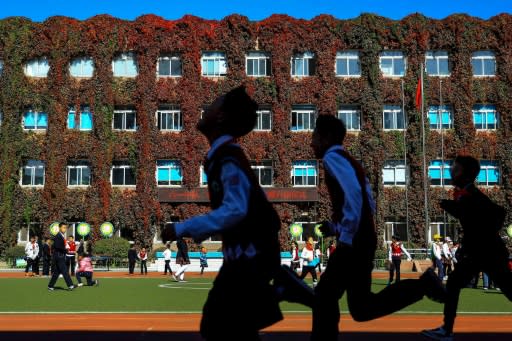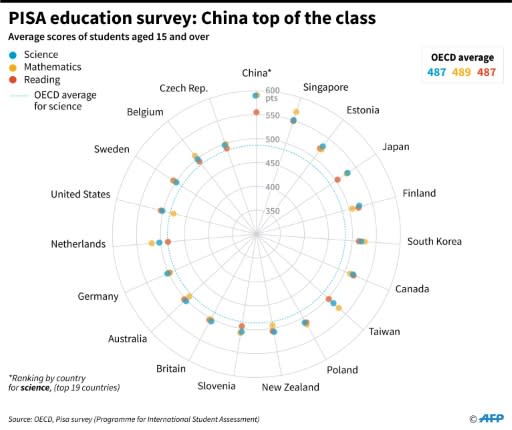China outclasses West in key education survey
Teenagers from four big Chinese regions outshone their contemporaries in Western nations in a keenly watched survey of education capabilities published Tuesday, which also showed no improvement trend in developed countries over the past two decades. The PISA survey is carried out every three years by the Paris-based Organisation for Economic Cooperation and Development (OECD), this time among its 37 member states and 42 partner countries and economies. The latest study, based on two-hour tests taken by 600,000 15-year-olds last year, showed that students in the four Chinese regions of Beijing, Shanghai, Jiangsu and Zhejiang -- as well as Singapore -- topped the rankings, ahead of their Western counterparts in reading, mathematics and science. "In many Asian countries, the education of children is priority number one," said Eric Charbonnier, an education analyst at the OECD. "Teachers have high-quality training and there have been investments in schools that had difficulties," he added. In reading, which the OECD considers its headline indicator of education potential, the best performing OECD state was the tiny Baltic nation of Estonia, followed by Canada, Finland and Ireland. Bigger European nations languished well behind in the rankings, with Britain in 14th place, Germany 20th and France 23rd. The United States placed 13th in reading. - 'By a large margin' - OECD secretary-general Angel Gurria said the students from the four Chinese provinces had "outperformed by a large margin their peers from all of the other 78 participating education systems". Moreover, the 10 percent most socio-economically disadvantaged students in these four areas "also showed better reading skills than those of the average student in OECD countries, as well as skills similar to the 10 percent most advantaged students in some of these countries," he said at a Paris news conference. He cautioned that these four provinces and municipalities in eastern China "are far from representing China as a whole." Yet their combined populations amount to over 180 million people, and the size of each region is equivalent to a typical OECD country even if their income is well below the OECD average. "You don't have to spend more to do better, that is a conclusion," Guria said. "We also see remarkable improvement in some countries that perform way below the OECD average, but they are improving very fast," he said, citing Albania, Moldova, Peru and Qatar. - 'Virtually no improvement' - But Gurria also sounded a word of caution over the Chinese system, indicating that more care needed to be taken with regards to students' well-being. "When it comes to those social and emotional outcomes, the top-performing Chinese provinces/municipalities are among the education systems with most room for improvement," he said in a preface to the report. Looking at the results of the developed OECD countries, he said it was "disappointing" that most member states had seen "virtually no improvement in the performance of their students" since the first PISA survey of 2000. This outcome came despite expenditure per primary and secondary student rising by more than 15 percent across OECD countries over the past decade. The survey said among OECD countries, the mean performances in reading, mathematics and science remained stable from the previous survey, in 2015, though some countries outside the group had shown large differences in performance. Albania, Estonia, the Chinese region of Macao, Peru and Poland saw improvements in two subjects over the last two decades. The OECD praised Brazil, Indonesia, Mexico, Turkey and Uruguay for enrolling many more 15-year-olds in secondary education "without sacrificing the quality of the education provided". - 'Postcode a predictor' - Gurria also sounded a warning over how ready students were to deal with the challenges of modern world, where it is important not just to read but to sort good information from bad. "Fewer than 1 in 10 students in OECD countries was able to distinguish between fact and opinion, based on implicit cues pertaining to the content or source of the information," he said. Gurria said that while some countries had shown that socio-economic status should not be an indicator of educational performance, "it remains necessary for many countries to promote equity with much greater urgency". "Against this background, it is disappointing that in many countries a student's or school's post code remains the strongest predictor of their achievement," he said. Students in four Chinese regions topped the rankings, ahead of their Western counterparts in reading, mathematics and science Graphic showing the top 19 countries for science with scores in maths and reading for students 15 years and over, according to the latest PISA survey by the OECD.



